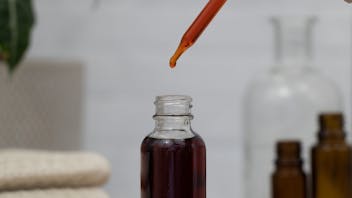Product Overview
We have a very fine Texas Cedarwood essential oil – it displays great tenacity and a pleasantly balsamic, smoky-‘pencil-woody’, sweet, somewhat tar-like, faintly oily aroma that becomes sweeter in the drydown. This oil has attributes similar to Virginia Cedarwood[1] and is used extensively in the perfume industry due to its versatility and being readily available.[2]
Texas Cedarwood, also known as Mountain Cedar, Mexican Cedar or Mexican Juniper, is actually from a Juniper, Juniperus mexicana (also known as Juniperus ashei), a small, shrub-like evergreen tree native to extreme southwestern Texas and New Mexico and most of Arizona; its range also extends into Mexico and Central America.[3] Tree growth tends to be crooked or twisted and the wood easily cracks, making it unsuitable for building material.[4] Discarded trees and tree stumps from land clearing operations are used for distillation of the essential oil[5], the main constituents of which are Thujopsene, α-Cedrene, Cedrol, and ß-Cederne, along with numerous others in smaller amounts.[6]
Please be aware when purchasing Cedar essential oil. Atlas Cedarwood and Himalayan Cedarwood are the most notably used for aromatherapy, have a more balsamic aroma, and are the only true Cedars typically available. Texas Cedarwood and Virginia Cedarwood are actually Junipers and although quite useful, are different in aroma and effects. Also, Cedar Leaf oil (Thuja occidentalis, also known as American Arborvitae, Eastern Arborvitae, Eastern White Cedar, Swamp Cedar, or Northern White Cedar[7],) is from a type of Cypress that is best used very carefully or not at all due to its toxicity.[8]
1 Lawless, Julia. The Encyclopedia of Essential Oils, 2013, p. 67.
2 Arctander, Steffen. Perfume and Flavor Materials of Natural Origin, 1960, pp. 145.
3 Lawless, Julia. The Encyclopedia of Essential Oils, 2013, p. 67.
4 Ibid.
5 Tisserand, Robert and Rodney Young. Essential Oil Safety, 2014, pp. 239-240.
6 Ibid.
7 Tisserand, Robert and Rodney Young. Essential Oil Safety, 2014, p. 448.
8 Rhind, Jennifer Peace Rhind. Essential Oils – A Handbook for Aromatherapy Practice, 2nd ed., 2012, p. 236.



